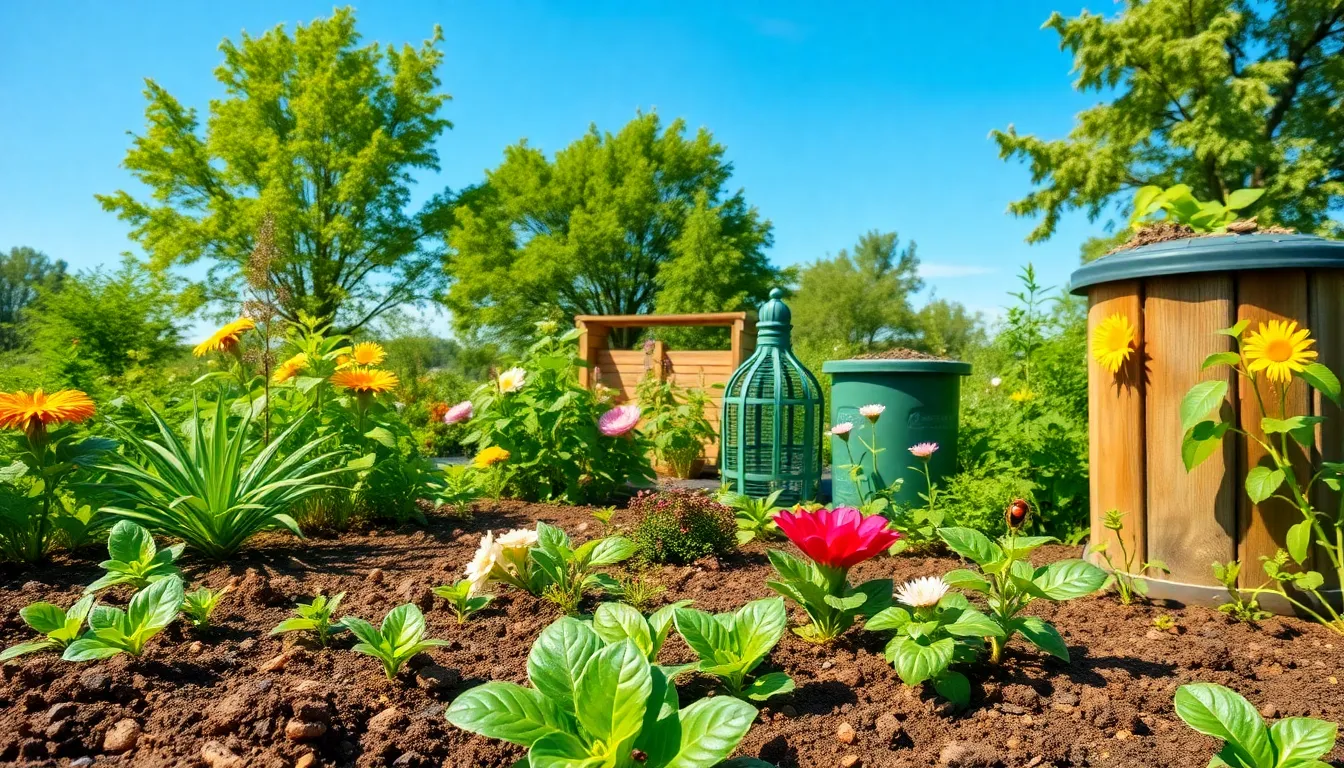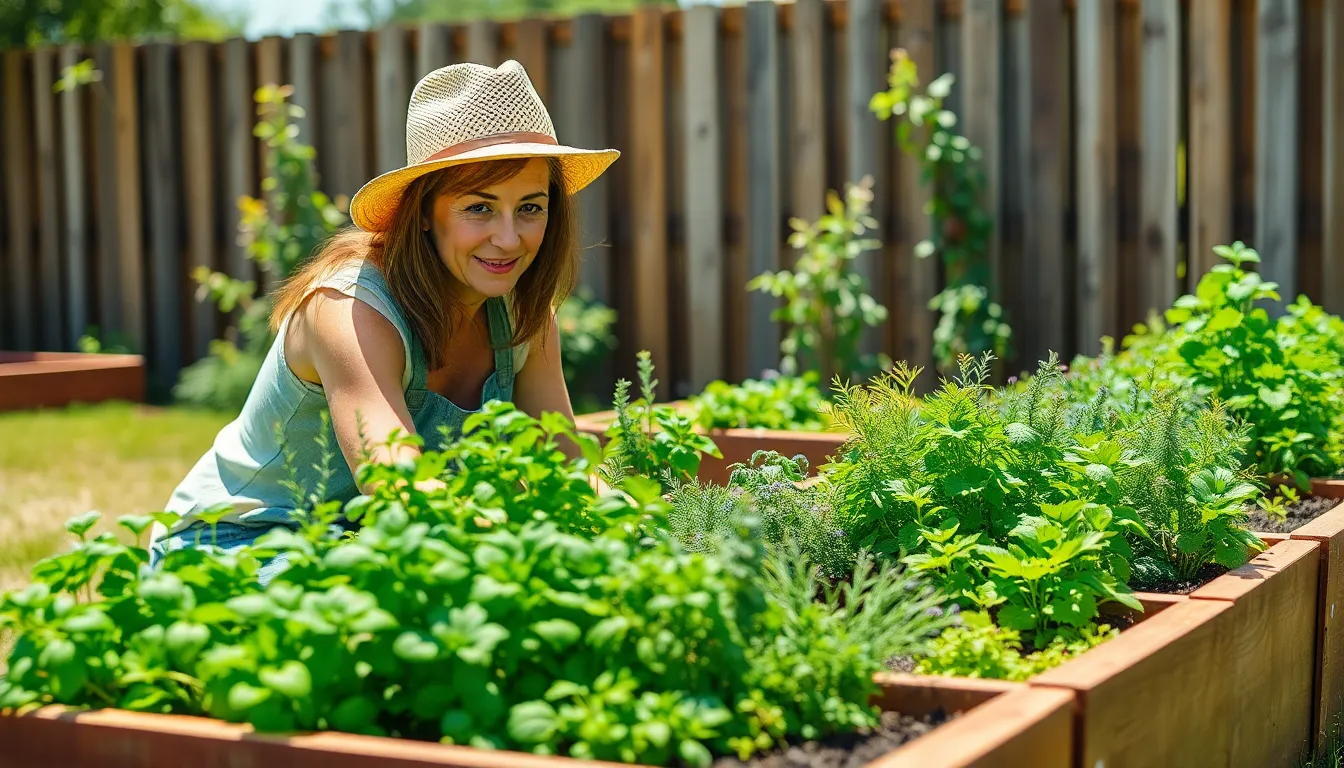Organic gardening is more than just a trend; it’s a sustainable lifestyle choice that offers numerous benefits for both the gardener and the environment. By avoiding synthetic pesticides and fertilizers, organic gardening promotes healthier soil and biodiversity, creating a thriving ecosystem right in one’s backyard.
Not only does it yield fresh, chemical-free produce, but it also fosters a deeper connection to nature. Engaging in organic gardening can enhance physical and mental well-being, providing a sense of accomplishment and tranquility. As more people turn to this eco-friendly practice, the positive impact on personal health and the planet becomes increasingly clear.
Table of Contents
ToggleUnderstanding Organic Gardening
Organic gardening emphasizes natural methods to cultivate plants, focusing on sustainability and ecosystem health. This approach minimizes synthetic inputs, thereby enhancing the quality of produce and the surrounding environment.
Definition of Organic Gardening
Organic gardening refers to cultivating plants without synthetic chemicals, pesticides, or genetically modified organisms (GMOs). It utilizes natural substances and processes to promote plant growth. Practices include composting, crop rotation, and encouraging beneficial insects. Certification standards vary by region, but the goal remains consistent: to produce food and plants in harmony with nature.
Principles of Organic Gardening
- Soil Health: Prioritizing soil vitality enhances nutrient availability and promotes healthy plant growth. Techniques like cover cropping and composting enrich the soil with organic matter.
- Biodiversity: Promoting diverse plant and animal life increases ecosystem resilience. Planting various species attracts beneficial insects and minimizes pest issues.
- Natural Pest Management: Employing strategies like companion planting and biological controls reduces the reliance on chemical pesticides. This creates a balanced ecosystem that naturally mitigates pest populations.
- Sustainability: Emphasizing renewable resources and minimizing waste supports long-term agricultural viability. This includes using native plants and natural fertilizers.
- Water Conservation: Implementing methods such as drip irrigation and mulching conserves water while maintaining healthy plant growth. These practices decrease evaporation and improve soil moisture retention.
- Seasonal Planting: Selecting crops based on seasonal cycles optimizes growth and yield. It accounts for local climate conditions, ensuring productive harvests.
By adhering to these principles, organic gardening fosters a sustainable relationship between human activities and natural ecosystems.
Environmental Benefits of Organic Gardening

Organic gardening offers numerous environmental benefits, contributing significantly to ecosystem health. Such practices foster sustainable environments, ensure soil quality, and enhance biological diversity.
Soil Health Improvement
Organic gardening focuses on nourishing soil through natural methods. Composting, cover cropping, and mulching enrich soil structure and fertility. These techniques prevent soil erosion and promote the presence of beneficial microorganisms. Healthy soil stores more carbon, reducing greenhouse gas emissions and combating climate change. Organic gardeners maintain nutrient cycles, minimizing the reliance on synthetic fertilizers, which can contaminate water sources.
Biodiversity Enhancement
Organic gardening enhances biodiversity by creating habitats for various organisms. By avoiding chemical pesticides, gardeners support beneficial insects, birds, and soil-dwelling organisms. These species participate in natural pest control and pollination. Diverse plant species in organic gardens attract a wider range of critters, fostering a balanced ecosystem. Increased biodiversity also improves the resilience of garden ecosystems against pests and diseases, contributing to overall environmental stability.
Health Benefits of Organic Gardening
Organic gardening significantly improves individual health through its emphasis on chemical-free cultivation and enhanced nutritional value.
Chemical-Free Produce
Organic gardening produces fruits and vegetables free from synthetic pesticides and fertilizers. These chemical-free foods lower exposure to harmful substances linked to health issues, such as endocrine disruption and cancer. The practice often results in produce that not only tastes better but also contributes to a healthier diet. Many studies, including findings from the Organic Trade Association, show that organic produce contains fewer pesticide residues compared to conventionally grown alternatives. By opting for organic, individuals support their overall health and wellness.
Nutritional Value
Organic foods typically boast higher nutritional value than their conventionally grown counterparts. Research published in the British Journal of Nutrition highlights that organic fruits and vegetables often contain higher concentrations of antioxidants and essential nutrients. Antioxidants play a pivotal role in combating oxidative stress and reducing the risk of chronic diseases. Additionally, organic practices enhance soil fertility and microbial activity, which positively influences nutrient uptake in plants. This results in healthier, more nutrient-dense produce that benefits consumers’ health and well-being.
Economic Benefits of Organic Gardening
Organic gardening yields various economic advantages, impacting both individuals and broader markets. By adopting organic practices, growers and consumers alike experience significant financial benefits.
Cost Savings
Cost savings emerge from reduced reliance on commercial fertilizers and pesticides. Organic gardeners utilize natural alternatives, such as compost or manure, which often lower input costs. Gardeners can also save on water expenses by employing efficient irrigation practices, like drip systems, and utilizing techniques that improve soil moisture retention. Notably, growing food at home decreases grocery bills, enabling families to allocate funds to other essential needs. The initial investment in organic seeds and tools often recoups over time through these savings.
Market Demand for Organic Products
Market demand for organic products continues to rise, driven by consumer awareness of health and environmental considerations. According to the Organic Trade Association, U.S. organic sales reached $62 billion in 2021, marking a 12.4% increase from the previous year. This growth offers opportunities for organic gardeners to enter local markets, farmers’ markets, and community-supported agriculture (CSA) programs, generating additional income. Higher prices for organic produce reflect premium quality, allowing growers to earn more per unit sold. Increased demand incentivizes organic gardening practices, creating economic growth within local communities.
Social Benefits of Organic Gardening
Organic gardening fosters a sense of community and provides various educational opportunities that enhance social interactions and knowledge sharing.
Community Engagement
Organic gardening strengthens community ties through shared gardening initiatives and local projects. Community gardens, for example, create spaces where individuals come together to cultivate food, fostering collaboration and social interaction. These gardens often serve as venues for neighborhood events, workshops, and social gatherings, further enhancing community bonds. Participants often share resources, exchange gardening tips, and collaborate on projects. By involving diverse groups, organic gardening cultivates inclusivity and encourages connections among residents, supporting social well-being.
Educational Opportunities
Organic gardening presents numerous educational opportunities that enrich individual and community knowledge. Workshops, seminars, and hands-on training sessions teach participants sustainable gardening practices, including composting, soil management, and pest control. Schools and community organizations often implement programs that engage children in gardening, promoting environmental stewardship and healthy eating habits. These educational initiatives raise awareness about the benefits of organic practices, motivating individuals to adopt eco-friendly lifestyles. Additionally, sharing knowledge within the gardening community fosters a culture of learning and supports personal growth.
Organic gardening stands out as a powerful approach that enriches both personal health and the environment. By embracing sustainable practices, individuals not only cultivate nutritious food but also contribute to a thriving ecosystem. The benefits extend beyond the garden, fostering community connections and enhancing social well-being.
As more people recognize the advantages of organic gardening, the movement continues to grow. This eco-friendly practice not only supports healthier lifestyles but also promotes environmental stewardship. With its emphasis on natural methods and biodiversity, organic gardening is a vital step toward a more sustainable future for all.




